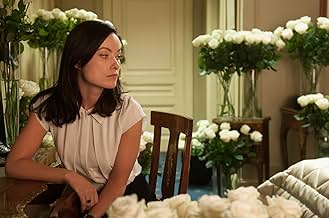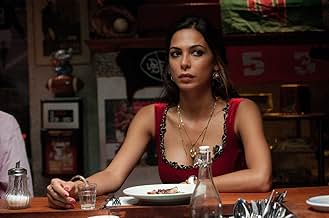PUNTUACIÓN EN IMDb
6,3/10
30 mil
TU PUNTUACIÓN
Tres historias de amor entrelazadas entre tres parejas de tres ciudades: Roma, París y Nueva York.Tres historias de amor entrelazadas entre tres parejas de tres ciudades: Roma, París y Nueva York.Tres historias de amor entrelazadas entre tres parejas de tres ciudades: Roma, París y Nueva York.
- Premios
- 1 premio y 1 nominación en total
Reseñas destacadas
Liam Neeson plays Michael, a writer. His eyes are curiously and deceptively filled with feeling and warmth even as his character plays out as a "sociopath" who has trouble feeling anything genuine toward other people. Yet, he is obsessed with the creation of emotion, as if the suspension of love in mid-air between two people is his home and friend. His mind is similarly disembodied. He feels need for love, especially when he is deprived of his lover's presence, but the actual presence of that body works to quickly diffuse the passion that is powerful in theory but thrives on it's staying in that theoretical strata. Michael has found a way, through his writing, to cope with this absurd existence. He finds the answer to his addiction in the creation of fiction using people in real life. He lets life naturally play out around him, provoking into being both the subtle and blatant forms of passion, romanticism, divine emotion and drama, then filters these experiences onto paper, choosing only the best parts, and throwing away the rest. Including any irrelevant parts of himself. In this way, he chooses to live his own life in a half-existence, desperately clinging to the divinity of love while denying the bitter absence of his ability to express it genuinely. 'Genuinely' is the key word here. Surely delivering hundreds of white roses to the bedroom of his lover Anna, (played by Olivia Wilde), is beyond romantic. But for Michael it is an act of intellect, not passion. It is a tool used to evoke the necessary catalyst, letting life display action, and funneling the magic into his own words.
Anna is a woman and entity that is completely unique in relation to anyone else in the movie and expresses a shade of mentality that I've never seen in a film so clearly. Within the life spans of each character prior to the timeline of the film is a catastrophic event involving either children or themselves as children. This is a line of storytelling that is evenly and thoroughly paved, on which it is typically easy to carry an audience. Because of such and such event in one's childhood, this character turned out to be this and this. The audience willingly nods to almost any such explanation that follows this logic; the more messed up, the more believable. Anna's case certainly gives her some degree of excusability in this story, though that concept is for another time and another debate. Incredibly, this event, though strong and controversial, does not outshine the vivid expression of her mentality through her actions prior to the unveiling of this childhood/adulthood disaster. She is blunt, cold and incredibly sadistic when it comes to attacking Michael. She is spontaneous, child-like and in considerable anguish. She is excited by the same game that Michael is, and this is what holds them together through the poisonous collisions with the sterility of every-day life. There game is fun, sexy. The fact that in their spontaneous role-play they are acutely aware of the other's true mentality builds a mutual sexual excitement; they can't wait to see how the story will turn out this time, whether it leaves Anna naked in the hallway of a hotel, or hundreds of flowers left in her empty room. The plain of existence could go on exponentially from here in satisfaction for Michael, but for Anna there is a step further down that makes her existence with Michael inhospitable. She is aware and ashamed of her acidic behavior towards Michael, and she has settled into a resolution of consistent punishment for those actions; at least she is trying very hard to. Michael makes this wish impossible in his equally consistent forgiveness for the sake of not losing his muse. As a result, Anna is catapulted into despair as she does not receive the intake of pain and rebuke she expects, resolute that she in no way deserves forgiveness or love; both of which she has long since destroyed within herself. Confronted with a room full of roses, she is helpless to respond in any way other than crawling, slowly and humbly, back to her indestructible lover...
http://funkyforestfirstcontact.wordpress.com/
Anna is a woman and entity that is completely unique in relation to anyone else in the movie and expresses a shade of mentality that I've never seen in a film so clearly. Within the life spans of each character prior to the timeline of the film is a catastrophic event involving either children or themselves as children. This is a line of storytelling that is evenly and thoroughly paved, on which it is typically easy to carry an audience. Because of such and such event in one's childhood, this character turned out to be this and this. The audience willingly nods to almost any such explanation that follows this logic; the more messed up, the more believable. Anna's case certainly gives her some degree of excusability in this story, though that concept is for another time and another debate. Incredibly, this event, though strong and controversial, does not outshine the vivid expression of her mentality through her actions prior to the unveiling of this childhood/adulthood disaster. She is blunt, cold and incredibly sadistic when it comes to attacking Michael. She is spontaneous, child-like and in considerable anguish. She is excited by the same game that Michael is, and this is what holds them together through the poisonous collisions with the sterility of every-day life. There game is fun, sexy. The fact that in their spontaneous role-play they are acutely aware of the other's true mentality builds a mutual sexual excitement; they can't wait to see how the story will turn out this time, whether it leaves Anna naked in the hallway of a hotel, or hundreds of flowers left in her empty room. The plain of existence could go on exponentially from here in satisfaction for Michael, but for Anna there is a step further down that makes her existence with Michael inhospitable. She is aware and ashamed of her acidic behavior towards Michael, and she has settled into a resolution of consistent punishment for those actions; at least she is trying very hard to. Michael makes this wish impossible in his equally consistent forgiveness for the sake of not losing his muse. As a result, Anna is catapulted into despair as she does not receive the intake of pain and rebuke she expects, resolute that she in no way deserves forgiveness or love; both of which she has long since destroyed within herself. Confronted with a room full of roses, she is helpless to respond in any way other than crawling, slowly and humbly, back to her indestructible lover...
http://funkyforestfirstcontact.wordpress.com/
*** MAY CONTAIN SPOILERS***
Paul Haggis has a heavy burden after winning Best Picture at the Oscars with "Crash," as high expectations have soon formulated any time he creates an interwoven story. Third Person, with its stellar cast and beautiful scenery, amplifies the hype, but unlike its predecessor, it doesn't deliver.
Third Person tells three love stories, featuring unrelatable caricatures. Liam Neeson is a Pulitzer-prize winner author, who smokes cigarettes in darkness and slams his Macbook when ideas don't seamlessly flow to him (people do that?). Olivia Wilde is a charming though emotionally-detached single-in-the-city gal. Adrian Brody is an American in Rome who detests the culture yet thrives in stealing. James Franco is artist-son of wealthy New Yorkers really? The characters often lack chemistry and their development often seems forced to fill the 'love du jour' trend of love-then-fighting-then love again. The performances are uninspiring, with the exception of Mila Kunis, who plays an ex-soap opera star and single mother trying to get her life back together.
Haggis spent many years crafting this film, but he had to verbally inform the audience of many of the interwoven intricacies. The film will appeal to the New York liberal intellectual crowd who thrive on 'complex' characters, but ultimately, this movie is all sizzle, no steak.
After the TIFF movie premiere, Haggis candidly stated that for the film he had difficulty attaining financing until the last minute. Perhaps this was an omen.
Paul Haggis has a heavy burden after winning Best Picture at the Oscars with "Crash," as high expectations have soon formulated any time he creates an interwoven story. Third Person, with its stellar cast and beautiful scenery, amplifies the hype, but unlike its predecessor, it doesn't deliver.
Third Person tells three love stories, featuring unrelatable caricatures. Liam Neeson is a Pulitzer-prize winner author, who smokes cigarettes in darkness and slams his Macbook when ideas don't seamlessly flow to him (people do that?). Olivia Wilde is a charming though emotionally-detached single-in-the-city gal. Adrian Brody is an American in Rome who detests the culture yet thrives in stealing. James Franco is artist-son of wealthy New Yorkers really? The characters often lack chemistry and their development often seems forced to fill the 'love du jour' trend of love-then-fighting-then love again. The performances are uninspiring, with the exception of Mila Kunis, who plays an ex-soap opera star and single mother trying to get her life back together.
Haggis spent many years crafting this film, but he had to verbally inform the audience of many of the interwoven intricacies. The film will appeal to the New York liberal intellectual crowd who thrive on 'complex' characters, but ultimately, this movie is all sizzle, no steak.
After the TIFF movie premiere, Haggis candidly stated that for the film he had difficulty attaining financing until the last minute. Perhaps this was an omen.
When I received an invite to go to the screening of Third Person, I was a bit uncertain whether this would be a decent flick or not. I hadn't seen any trailers or read articles about it so I did not know what to expect.
Third person is a film from Paul Haggis ( the director of the Oscar- winning "Crash") involving intertwining stories featuring Liam Neeson, Olivia Wilde, Adrien Brody, Mila Kunis, James Franco, Maria Bello, Moran Atlas and Kim Basinger.
Having not seen Crash, I hadn't raised my expectations to spectacular levels. Maybe this is why Third Person is getting a mediocre score, people simply compare it with Crash and not as an individual movie.
Let me begin by stating that the atmospheric feel of the movie is top notch. Whether it is the chic, extravagant life-style in Paris, the beautiful and not-so beautiful side of Rome or the busy streets in New York, every city is portrayed in a beautiful way. The soundtrack is okay and fits with the mood of the scenes.
The acting is , how could it not be with this cast, top-notch ! Especially Mila Kunis surprised me with her emotionally depth, a side of her that we don't see a lot in her movies.
Of course, with different intertwining stories, people will argue which one is the best of the bundle. Let me make this clear : Each story is very intriguing and has plot twists that I did not see coming. You could feel everyone staring with great surprise at the screen when major twists came.
For me, the best story was the part with Adrien Brody and Moran Atlas. They had the best chemistry in the movie, with a very interesting dilemma. It had the funniest and most-thrilling moments ( according to me of course, the others are very well made as well, this is truly a matter of personal taste ).
But the movie has a big flaw. The link between the stories is rather weak ( I still have no idea how Adrien's story was linked with the rest of them, when this movie releases for all audiences someone will maybe find that link ). The wrap-around at the end was very, very confusing and didn't make a lot of sense. It was surprising , yes, but really no- one understood what the ending meant for the story. But I think that if this movie gets analyzed and someone clearly explains it's ending, my appreciation for this movie would certainly be of the roof.
I'm not the type of guy who volunteers to watch a romantic drama, I even dread the thought of watching another chick-flick/tear-buster with the girlfriend. But this drama pulled me into it's story with fantastic performances from an awesome cast, good writing/directing for each storyline and a fine balance between drama, romance and humor.
And for that great achievement, this movie deserves :
7,5 /10
Third person is a film from Paul Haggis ( the director of the Oscar- winning "Crash") involving intertwining stories featuring Liam Neeson, Olivia Wilde, Adrien Brody, Mila Kunis, James Franco, Maria Bello, Moran Atlas and Kim Basinger.
Having not seen Crash, I hadn't raised my expectations to spectacular levels. Maybe this is why Third Person is getting a mediocre score, people simply compare it with Crash and not as an individual movie.
Let me begin by stating that the atmospheric feel of the movie is top notch. Whether it is the chic, extravagant life-style in Paris, the beautiful and not-so beautiful side of Rome or the busy streets in New York, every city is portrayed in a beautiful way. The soundtrack is okay and fits with the mood of the scenes.
The acting is , how could it not be with this cast, top-notch ! Especially Mila Kunis surprised me with her emotionally depth, a side of her that we don't see a lot in her movies.
Of course, with different intertwining stories, people will argue which one is the best of the bundle. Let me make this clear : Each story is very intriguing and has plot twists that I did not see coming. You could feel everyone staring with great surprise at the screen when major twists came.
For me, the best story was the part with Adrien Brody and Moran Atlas. They had the best chemistry in the movie, with a very interesting dilemma. It had the funniest and most-thrilling moments ( according to me of course, the others are very well made as well, this is truly a matter of personal taste ).
But the movie has a big flaw. The link between the stories is rather weak ( I still have no idea how Adrien's story was linked with the rest of them, when this movie releases for all audiences someone will maybe find that link ). The wrap-around at the end was very, very confusing and didn't make a lot of sense. It was surprising , yes, but really no- one understood what the ending meant for the story. But I think that if this movie gets analyzed and someone clearly explains it's ending, my appreciation for this movie would certainly be of the roof.
I'm not the type of guy who volunteers to watch a romantic drama, I even dread the thought of watching another chick-flick/tear-buster with the girlfriend. But this drama pulled me into it's story with fantastic performances from an awesome cast, good writing/directing for each storyline and a fine balance between drama, romance and humor.
And for that great achievement, this movie deserves :
7,5 /10
Paul Haggis both wrote and directed this very long movie (137 minutes) that plays with our minds in a way not dissimilar to his most famous similar film CRASH. The quilted story takes patience and close attention to paste each of the three running stories together – three (at times augmented) couples whose lives are altered in some way by a child – drowning, abusive by placing in a plastic bag, a conveniently imagined child – and it all ties together with slips of paper, pages of novels, paintings and other threads spread around Paris, Rome, and New York.
'Michael (Liam Neeson) is a Pulitzer Prize-winning fiction author who has sequestered himself in a hotel suite in Paris to finish his latest book. He recently left his wife, Elaine (Kim Basinger), and is having a tempestuous affair with Anna (Olivia Wilde), an ambitious young journalist who wants to write and publish fiction. At the same time, Scott (Adrien Brody), a shady American 'clothing designer' businessman, is in Italy to steal designs from fashion houses. Hating everything Italian, Scott wanders into the Café American with barkeep Marco (Riccardo Scamarcio) in search of something familiar to eat. There, he meets Monika (Moran Atias), a beautiful Romanian woman, who is about to be reunited with her young daughter. When the money she has saved to pay her daughter's smuggler Carlo (Viinico Marchioni) has stolen, Scott feels compelled to help. They take off together for a dangerous town in Southern Italy, where Scott starts to suspect that he is the patsy in an elaborate con game. Julia (Mila Kunis), an ex-soap opera actress, is caught in a custody battle for her 6 year-old son with her ex-husband Rick (James Franco), a famous New York artist. With her support cut off and her legal costs ruinous, Julia is reduced to working as a maid in the same upscale boutique hotel where she was once a frequent guest. Julia's lawyer Theresa (Maria Bello) has secured Julia one final chance to change the court's mind and be reunited with the child she loves. Rick's current girlfriend Sam (Loan Chabanol) is a compassionate onlooker.'
With a cast such as this the film works as well as it can with such obtuse twists and turns involving each of the three couples. The film 'feels' like it wants to be wonderful, but it just plods along too slowly to make us care very much about this odd groups of maladjusted misfits.
'Michael (Liam Neeson) is a Pulitzer Prize-winning fiction author who has sequestered himself in a hotel suite in Paris to finish his latest book. He recently left his wife, Elaine (Kim Basinger), and is having a tempestuous affair with Anna (Olivia Wilde), an ambitious young journalist who wants to write and publish fiction. At the same time, Scott (Adrien Brody), a shady American 'clothing designer' businessman, is in Italy to steal designs from fashion houses. Hating everything Italian, Scott wanders into the Café American with barkeep Marco (Riccardo Scamarcio) in search of something familiar to eat. There, he meets Monika (Moran Atias), a beautiful Romanian woman, who is about to be reunited with her young daughter. When the money she has saved to pay her daughter's smuggler Carlo (Viinico Marchioni) has stolen, Scott feels compelled to help. They take off together for a dangerous town in Southern Italy, where Scott starts to suspect that he is the patsy in an elaborate con game. Julia (Mila Kunis), an ex-soap opera actress, is caught in a custody battle for her 6 year-old son with her ex-husband Rick (James Franco), a famous New York artist. With her support cut off and her legal costs ruinous, Julia is reduced to working as a maid in the same upscale boutique hotel where she was once a frequent guest. Julia's lawyer Theresa (Maria Bello) has secured Julia one final chance to change the court's mind and be reunited with the child she loves. Rick's current girlfriend Sam (Loan Chabanol) is a compassionate onlooker.'
With a cast such as this the film works as well as it can with such obtuse twists and turns involving each of the three couples. The film 'feels' like it wants to be wonderful, but it just plods along too slowly to make us care very much about this odd groups of maladjusted misfits.
Third Person seeks to explore the betrayal of trust—the betrayal of fidelity and friendship. Paul Haggis, the director, has made a career out of making films that interweave numerous story lines. In this case, Liam Neeson, Olivia Wilde, Adrien Brody, Mila Kunis, and James Franco all comprise a wonderful ensemble that demands a range of powerful emotions to drive this story through its incessant melodrama (no negative connotation applied). The narrative here focuses on the romantic relationships and affairs that unfortunately still plague society and humanity's untamable nature. I'm sure we all know the implication of the film's title ("Third Person"), and with that, the drama goes on an almost two-and-a-half-hour drive through tense dialogue, flirtation, and sexy teases.
The movie teases and teases but never seems to reach the climax that its lengthy build-up continually suggests. Its first hour is fairly compelling in its set-up, deliberately introducing the audience to the exact predicament and its hapless participants. The plot over the rest of the film unravels quite cryptically, as well as in a manner that might appear heavily contrived to many viewers. There is a certain degree to which a suspension of belief should absolutely be mustered upon entering this picture. Aside from the contrivances, moments exist within that play to extreme dramatic effect but actually lead to a whole lot of nothing. After a great deal of meticulous development, a character screams and terrorizes a room out of realized anger as a tragic score plays to the segment's tune even though that scene essentially has no consequence in the sequences that follow (the character simply returns to a former state) as if the filmmaker was stylishly proceeding towards tragedy and quickly mopping up soon thereafter.
The actors themselves do a fantastic job and glue us to the screen albeit the script's occasional muddling of the conflict at hand. Adrien Brody, in my opinion, is the standout here, possessing a complex personality that battles between moral decisions and his wild desires. The writing in the first few scenes of his arc—we find him in a bar having a natural conversation with a mysterious woman (Moran Atias) as we immediately discern his dislike for foreign environments (particularly Italy) and his highly talkative, forceful nature. Olivia Wilde and Liam Neeson share the screen in probably the most compelling storyline where Neeson's strong infatuation for Wilde lends itself to perfidy and constant ridicule. Wilde's character plays a hard-to-get, but incredibly seductive, "sexpot" who tests Neeson's true loyalty to her while he starts to construct his next novel. Mila Kunis' part of the tale is definitely the least intriguing in its somewhat clichéd essence— she's bouncing from job to job, barely able to pay her monthly bills and struggling to reclaim her kid who was taken from her based on accusations of abuse.
Like I said, all of these individual threads in an interlocking story initially engross, but then, Third Person starts to drag on and on. It sits at a runtime of 2 hours and 17 minutes but honestly feels like it's reaching the 3-hour mark. The connection between these separate stories begins to materialize the further we advance into the plot while also shadowing it with plenty of confusion at the same time. The last scene is a head-scratcher in a bad way. You're scratching your head because that "da dumb" twist moment unintentionally goes over everyone's head and falls flat in its execution. So, wait: how are they exactly connected thematically and emotionally? All I witnessed was a multitude of contrivances that saw these characters crossing each other's paths for a few seconds. Of course, there's a reason to all this once the very end comes to fruition, but the point of the entire ordeal sorely misses its mark. There's too much going on with the quick cutting intensifying as we progress, and none of the arcs conclude satisfyingly.
With that being said, I still respect Haggis' ambition and his ventures into such heart-rending tales. Contrary to general reception, I genuinely enjoyed Crash, and now, I most likely find myself enjoying Third Person more than most as well. It's primarily absorbing throughout, just a tad bit too long and woolly.
The movie teases and teases but never seems to reach the climax that its lengthy build-up continually suggests. Its first hour is fairly compelling in its set-up, deliberately introducing the audience to the exact predicament and its hapless participants. The plot over the rest of the film unravels quite cryptically, as well as in a manner that might appear heavily contrived to many viewers. There is a certain degree to which a suspension of belief should absolutely be mustered upon entering this picture. Aside from the contrivances, moments exist within that play to extreme dramatic effect but actually lead to a whole lot of nothing. After a great deal of meticulous development, a character screams and terrorizes a room out of realized anger as a tragic score plays to the segment's tune even though that scene essentially has no consequence in the sequences that follow (the character simply returns to a former state) as if the filmmaker was stylishly proceeding towards tragedy and quickly mopping up soon thereafter.
The actors themselves do a fantastic job and glue us to the screen albeit the script's occasional muddling of the conflict at hand. Adrien Brody, in my opinion, is the standout here, possessing a complex personality that battles between moral decisions and his wild desires. The writing in the first few scenes of his arc—we find him in a bar having a natural conversation with a mysterious woman (Moran Atias) as we immediately discern his dislike for foreign environments (particularly Italy) and his highly talkative, forceful nature. Olivia Wilde and Liam Neeson share the screen in probably the most compelling storyline where Neeson's strong infatuation for Wilde lends itself to perfidy and constant ridicule. Wilde's character plays a hard-to-get, but incredibly seductive, "sexpot" who tests Neeson's true loyalty to her while he starts to construct his next novel. Mila Kunis' part of the tale is definitely the least intriguing in its somewhat clichéd essence— she's bouncing from job to job, barely able to pay her monthly bills and struggling to reclaim her kid who was taken from her based on accusations of abuse.
Like I said, all of these individual threads in an interlocking story initially engross, but then, Third Person starts to drag on and on. It sits at a runtime of 2 hours and 17 minutes but honestly feels like it's reaching the 3-hour mark. The connection between these separate stories begins to materialize the further we advance into the plot while also shadowing it with plenty of confusion at the same time. The last scene is a head-scratcher in a bad way. You're scratching your head because that "da dumb" twist moment unintentionally goes over everyone's head and falls flat in its execution. So, wait: how are they exactly connected thematically and emotionally? All I witnessed was a multitude of contrivances that saw these characters crossing each other's paths for a few seconds. Of course, there's a reason to all this once the very end comes to fruition, but the point of the entire ordeal sorely misses its mark. There's too much going on with the quick cutting intensifying as we progress, and none of the arcs conclude satisfyingly.
With that being said, I still respect Haggis' ambition and his ventures into such heart-rending tales. Contrary to general reception, I genuinely enjoyed Crash, and now, I most likely find myself enjoying Third Person more than most as well. It's primarily absorbing throughout, just a tad bit too long and woolly.
¿Sabías que...?
- CuriosidadesJames Franco said that Ashton Kutcher, Mila Kunis' husband (fiancé then), couldn't endure watching the scene where Franco had to slap Kunis' face and drag her across the floor. Kutcher had to leave the room during the shooting. "I mean, it wasn't my idea!! It was the script!" Franco said. Further to the close of this scene, when dragging Kunis out across the rug, Franco's stumble at the end was unscripted: but director Haggis felt it suited the scene's intensity so left it in the final take. [Latter direction reference from director's own DVD commentary]
- PifiasWhen Olivia Wilde's character is locked out of Liam Neeson's character hotel room, she is completely naked and in such conditions she runs down the corridor and stairs towards her own room. When she enters it, she can be seen wearing knickers.
- Créditos adicionalesThe opening as well as the first part of the ending credits share the same graphic pattern style as the lower parts of the glass partitions in the apartment of Franco's character.
- ConexionesFeatured in Film '72: Episodio fechado 12 noviembre 2014 (2014)
- Banda sonoraChiaro
Performed by Gigi D'Alessio
Courtesy of GGD Srl.
Written by Gigi D'Alessio (as Luigi D'Alessio) and Valentina D'Agostina
Published by Warner Chappell Music Italiana Srl and GGD Edizioni Srl
All Rights Administered by Warner Chappell Music Italiana Srl
Selecciones populares
Inicia sesión para calificar y añadir a tu lista para recibir recomendaciones personalizadas
Detalles
- Fecha de lanzamiento
- Países de origen
- Sitio oficial
- Idiomas
- Títulos en diferentes países
- Amores infieles
- Localizaciones del rodaje
- Empresas productoras
- Ver más compañías en los créditos en IMDbPro
Taquilla
- Presupuesto
- 28.000.000 US$ (estimación)
- Recaudación en Estados Unidos y Canadá
- 1.021.398 US$
- Fin de semana de estreno en EE. UU. y Canadá
- 38.856 US$
- 22 jun 2014
- Recaudación en todo el mundo
- 2.624.761 US$
- Duración2 horas 17 minutos
- Color
- Mezcla de sonido
- Relación de aspecto
- 2.35 : 1
Contribuir a esta página
Sugerir un cambio o añadir el contenido que falta

Principal laguna de datos
What is the Hindi language plot outline for En tercera persona (2013)?
Responde






































